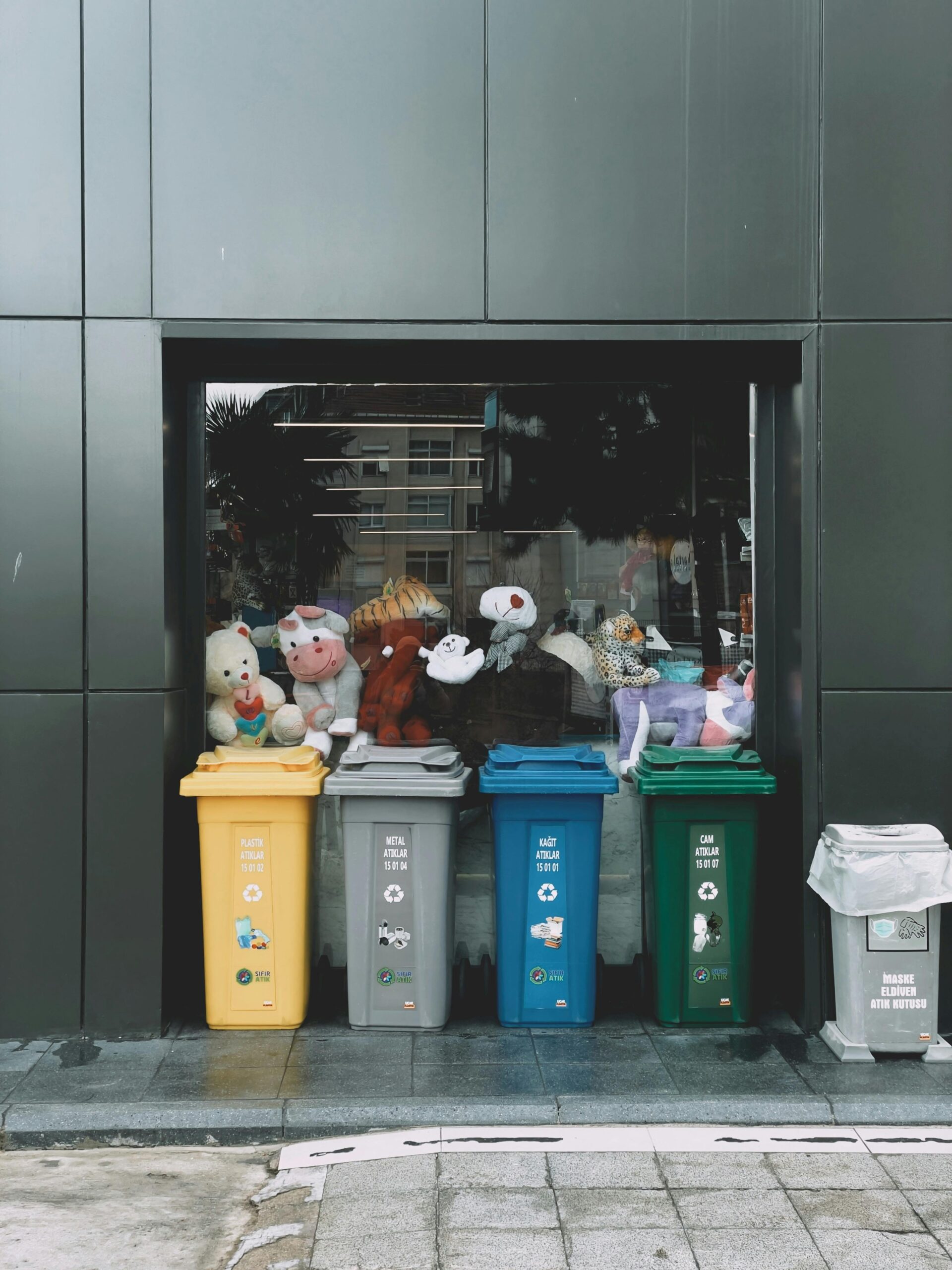Are you tired of the confusion surrounding Glasgow bins collection? Discovering the secrets to efficient waste disposal can transform your experience and make a positive impact on your community. In this article, we’ll unveil everything you need to know about Glasgow’s waste management system, from collection schedules to recycling tips that could save you time and hassle. Why struggle with rubbish when there are simple solutions at your fingertips?
Navigating the ins and outs of Glasgow’s bin collection can be overwhelming, but understanding the local guidelines can make all the difference. Have you ever wondered how to maximise your recycling efforts while ensuring your general waste is disposed of properly? We’ll delve into the most effective strategies for managing your household waste, including the importance of correct bin usage and the environmental benefits of proper waste separation.
Moreover, we’ll explore trending topics like the latest initiatives by Glasgow City Council aimed at reducing landfill waste and promoting sustainability. With the rise of eco-consciousness, knowing how to engage with these initiatives not only boosts your green credentials but also contributes to a healthier planet. So, whether you’re a long-time resident or a newcomer, stick with us as we guide you through the labyrinth of Glasgow bins collection—because efficient waste disposal is not just about cleanliness; it’s about creating a better future for all.
10 Essential Tips for Mastering Glasgow Bins Collection: A Complete Guide to Efficient Waste Disposal
Glasgow is a vibrant city, but like any bustling metropolis, it faces its fair share of waste management challenges. The Glasgow bins collection system is an integral part of keeping this city clean and green, and knowing how to navigate it can make a significant difference. This guide provides you with 10 essential tips for mastering the bins collection process. Whether you’re a long-time resident or new to the area, these tips will help you efficiently dispose of waste while contributing to a cleaner environment.
Know Your Collection Days
One of the most important factors in efficient waste disposal is knowing when your collection day is. Glasgow operates on a fortnightly collection schedule for general waste, recycling, and food waste. Each area has its designated collection days, which can vary. You can check your specific collection day on the Glasgow City Council website or on the app they provide.
- General Waste: Collected every two weeks.
- Recycling: Collected alternating weeks from general waste.
- Food Waste: Collected weekly.
Sort Your Waste Properly
Sorting your waste correctly is crucial. Glasgow has different bins for different types of waste, and putting the wrong items in a bin slows down the whole process and can even lead to fines. Here’s a simple list of what goes where:
- General Waste Bin: Non-recyclable items like polystyrene, some plastics, and dirty pizza boxes.
- Recycling Bin: Clean paper, card, glass bottles, and certain plastics marked with recycling symbols.
- Food Waste Bin: Any food scraps, including fruit peels and leftovers.
Use the Right Bin
Each type of waste needs to go in its specific bin. Putting recyclable items in the general waste bin can lead to contamination, which means those items won’t be recycled at all. It’s important for residents to be aware of what can and cannot be recycled. The city has provided clear guidelines, but many people still get confused.
Keep Your Bins Clean
A clean bin is a happy bin! Keeping your bins clean can help reduce unpleasant odours and pests. Wash your bins regularly, especially the food waste bin, which can attract flies and other insects if not kept in check. It’s recommended to use biodegradable liners for food waste to make cleaning easier.
Be Mindful of Contamination
If a bin is contaminated with non-recyclable items, it can lead to the whole load being sent to landfill instead of being recycled. This is not only bad for the environment but can also cost the city money. Be sure to double-check what you’re placing in your recycling bin to avoid contamination.
Report Missed Collections
Sometimes bins get missed during collection days. If this happens, it’s crucial to report it as soon as possible. You can do this through the Glasgow City Council website or mobile app. Reporting missed collections helps the council to monitor their collection services and improve efficiency.
Consider Using the Recycling Centres
For larger items or materials that can’t be collected through regular bins, Glasgow has several recycling centres. These centres accept a wide range of materials, including electrical goods and bulky waste. Check the opening times and what can be disposed of before you go.
Participate in Community Initiatives
Many communities in Glasgow engage in initiatives to promote recycling and waste reduction. Joining these initiatives not only helps the environment but also brings people together. Look out for local clean-up events or educational workshops about waste disposal and sustainability.
Stay Informed About Changes
Waste collection schedules and policies can change, so it’s important to stay updated. Following local news sources or signing up for council newsletters can keep you informed about any changes to the Glasgow bins collection system.
Educate Yourself and Others
Knowledge is power. Educating yourself about proper waste disposal practices can help you make more informed decisions. Additionally, sharing this knowledge with friends and family can create a ripple effect, encouraging more people to be responsible with their waste.
Managing waste in Glasgow doesn’t have to be a headache. By following these essential tips, you can make the bins collection process smoother and contribute to a cleaner city. Remember, every small action counts when it comes to efficient waste disposal! So, get involved, stay informed, and make Glasgow a greener place for everyone.
What You Need to Know About Glasgow’s Bins Collection Schedule: Unlocking the Secrets to Timely Waste Management
Glasgow, a vibrant city known for its culture and history, has a waste management system that many residents find confusing. With the city’s bins collection schedule often changing and sometimes difficult to keep track off, it’s crucial for locals to understand the ins and outs of this system. Knowing when to put your bins out can lead to a cleaner environment and helps ensure that waste is disposed of properly. If you’re a resident or just moving to Glasgow, here’s what you need to know about Glasgow’s bins collection schedule.
Understanding the Collection Schedule
In Glasgow, the collection of bins is done on a fortnightly basis for most types of waste. However, the schedule can vary depending on your local area. Here’s a breakdown:
- General Waste (Grey Bins): Collected every two weeks.
- Recycling (Blue Bins): Also collected every two weeks, but on alternate weeks to general waste.
- Food Waste (Brown Bins): Collected weekly, which is great for reducing landfill waste.
- Garden Waste (Green Bins): Collected on a seasonal basis, typically from spring to autumn.
Residents should check their local council’s website for specific collection days since they can differ even within different parts of Glasgow.
Historical Context of Waste Management in Glasgow
Glasgow’s approach to waste management has evolved over the years. Once, the city relied heavily on landfill sites for waste disposal, which led to various environmental issues. In the early 2000s, the local government began to implement more sustainable practices. They encouraged recycling and introduced different coloured bins to help residents separate their waste more effectively. This shift not only improved waste management but also played a key role in reducing pollution levels in the city.
Tips for Efficient Waste Disposal
Managing your waste can be easy if you follow these practical tips:
- Know Your Schedule: Always mark your collection days on your calendar. Set reminders on your phone.
- Separate Your Waste: Make sure to sort your recyclables and food waste. This helps in reducing contamination.
- Keep Bins Clean: Regularly clean your bins to avoid unpleasant odours and pests.
- Report Missed Collections: If your bin isn’t collected, report it to the council immediately. They may have a procedure in place for missed collections.
Common Mistakes to Avoid
When it comes to waste collection, there are several common pitfalls residents tend to fall into:
- Putting Bins Out Late: Many people forget to put bins out the night before collection day. This can lead to missed pickups.
- Contaminating Recycling: Improper disposal of non-recyclable items in blue bins can lead to the entire load being rejected.
- Ignoring Seasonal Changes: Garden waste collection stops during the winter months, so it’s important to plan accordingly.
Additional Resources
If you’re looking for more information about Glasgow’s bins collection, consider these resources:
- Glasgow City Council Website: The official site provides up-to-date collection schedules, waste disposal tips, and recycling information.
- Mobile Apps: There are several apps available that can send reminders for waste collection days and provide tips for sorting waste.
- Local Community Groups: Joining local community groups on social media can help you stay updated on waste management issues and share tips with fellow residents.
The Impact of Recycling
Recycling plays a vital role in waste management, not just for Glasgow but globally. Here’s why it matters:
- Reduces Landfill Use: Recycling cuts down on the amount of waste that ends up in landfills, contributing to a cleaner environment.
- Conserves Resources: Recycling materials like paper and glass reduces the need for new resources, which is crucial in a world facing resource depletion.
- Saves Energy: Producing new products from recycled materials often uses less energy compared to making them from raw materials.
Final Thoughts
Navigating Glasgow’s bins collection schedule might seem daunting at first, but with a little organization and awareness, it becomes manageable. By understanding the waste management system, residents can contribute to a cleaner, greener city. Whether you’re a long-time Glaswegian or new to the area, keeping track of your bins is essential for efficient waste disposal. So, mark those dates, sort your waste, and play your part in making Glasgow a more sustainable place to live. Remember, every little effort counts!
The Ultimate Glasgow Bins Collection FAQ: Answers to Your Most Pressing Waste Disposal Questions
If you’re living in Glasgow or just passing through, you might have some burning questions about the bins collection in the city. Understanding how waste disposal works is not only important for keeping the streets clean but also for ensuring that you’re playing your part in the environment. Many people wonder about the different bins, collection schedules, and what can actually go in each bin. This article aims to answer your most pressing questions regarding the Glasgow bins collection and help you discover secrets to efficient waste disposal.
What Bins Are Used in Glasgow?
Glasgow has a straightforward bin system designed to make waste disposal as efficient as possible. Here are the main types of bins you’ll encounter:
- General Waste Bin: This bin is for items that can’t be recycled. Think of food waste, broken items, and non-recyclable packaging.
- Recycling Bin: This bin is for recyclable materials like paper, cardboard, plastic bottles, and tins. It’s important to rinse out containers before disposal.
- Food Waste Bin: This is for organic waste like fruit peels, vegetable scraps, and leftover food. Composting is key to reducing landfill waste.
- Garden Waste Bin: For any garden-related waste like grass cuttings, leaves, and branches. Not all areas have this service, so check your local council’s guidelines.
When Does Collection Happen?
The collection schedule can vary depending on your area in Glasgow. Usually, the bins are collected on a fortnightly basis. Here’s a basic overview:
- General Waste: Collected every two weeks.
- Recycling: Collected every two weeks, alternating with general waste.
- Food Waste: Collected weekly in most areas.
- Garden Waste: Seasonal collection, typically from spring to autumn.
How Do I Know My Collection Day?
Finding out when your bins are collected is easy in Glasgow. You can check the council’s official website, which has a handy postcode lookup tool. You just enter your postcode and it tells you exactly when your bins will be collected. You can also sign up for reminders via text or email, which is really helpful.
What Can I Recycle?
Recycling is a big part of waste management. Here is a list of what you can typically recycle in Glasgow:
- Paper and Cardboard: Newspapers, magazines, and clean cardboard boxes.
- Plastics: Bottles, containers, and trays marked with recycling symbols.
- Metals: Cans from food and drink.
- Glass: Bottles and jars, but remember to remove the lids.
It’s crucial to check the recycling guidelines, as different materials may have specific requirements.
What Happens to My Waste?
Once collected, your waste goes through several processes:
- Sorting: Recyclables are taken to a material recovery facility where they’re sorted.
- Processing: Recyclables are cleaned and processed into raw materials.
- Transfer to Facilities: General waste is taken to landfill or energy recovery facilities, where waste can be converted into energy.
- Composting: Food and garden waste are turned into compost, which can be used to enrich soil.
What Should I Do If My Bin Is Missed?
It can be frustrating if your bin isn’t collected on schedule. If this happens, don’t panic. Here’s what you can do:
- Check for Service Updates: Sometimes, collections are delayed due to holidays or bad weather.
- Contact the Council: You can report a missed collection via the council’s website or customer service helpline.
- Leave Your Bin Out: If you’ve reported it, leave your bin out for a few days in case they return.
What Is Contamination and Why Does It Matter?
Contamination occurs when non-recyclable items are placed in recycling bins. This can lead to entire batches of recyclable materials being sent to landfill, which is not good for the environment. Here’s what you need to consider:
- It can increase the costs of recycling.
- It may result in stricter rules for what can be recycled.
- It can harm the recycling process itself.
Tips for Efficient Waste Disposal
Here are some practical tips for ensuring you’re managing your waste effectively:
- Plan Your Disposal: Keep a calendar of collection days so you never miss a pickup.
- Educate Your Family: Make sure everyone knows what goes where to reduce contamination.
- Consider Waste Reduction: Buy products with less packaging, and try to compost whenever possible.
Understanding the Glasgow bins collection system doesn’t have to be confusing. With a bit of knowledge, you can contribute to a cleaner and more sustainable environment. Remember, every small action counts. So, the next time you put out your bin, think about how you can do better for the planet!
How to Navigate Glasgow’s Bins Collection System: A Step-by-Step Approach to Eco-Friendly Waste Practices
Glasgow, a vibrant city known for its rich history and culture, also faces the challenge of waste management. With an increasing emphasis on eco-friendly practices, understanding how to navigate the Glasgow bins collection system is crucial for residents. This article aims to provide a step-by-step approach to make waste disposal easy and efficient while being environmentally conscious.
Understanding the Bins Collection System
The bins collection system in Glasgow is designed to help households and businesses dispose of waste in a responsible manner. The city operates a three-bin system, which includes:
- Blue Bins: For recyclable materials such as paper, card, plastics, and metals.
- Green Bins: For general waste that cannot be recycled. This includes food waste, broken items, and other non-recyclable rubbish.
- Brown Bins: Specifically for garden waste, like grass cuttings, leaves, and branches.
Knowing which bin to use is the first step in efficient waste disposal. Many people gets confused and mix items, leading to contamination of recyclable materials. This can make recycling less effective and even cause entire batches to be sent to landfill.
The Collection Schedule
Glasgow provides a collection schedule that is vital for residents to follow. Each area of the city might has different collection days. Here’s a simple way to keep track:
- Check Local Schedule: Visit the Glasgow City Council website or use their app to find your collection days.
- Set Reminders: Many people finds it helpful to set reminders on their phones a day before collection days.
- Know Your Neighbours: Often, neighbours can help remind each other about collection days, especially when holiday schedules might change.
Recycling Right: What Goes Where?
To avoid contaminating recyclable materials, it’s important to know exactly what can go in the blue bins. Here’s a quick guide:
Blue Bin (Recycling)
- Clean plastic bottles
- Cardboard boxes (flattened)
- Steel and aluminium cans
- Paper (not contaminated with food)
Green Bin (General Waste)
- Food scraps (not in plastic bags)
- Non-recyclable plastic items
- Broken glass (wrapped safely)
- Contaminated paper (like greasy takeout boxes)
Brown Bin (Garden Waste)
- Grass cuttings
- Leaves and twigs
- Small branches (cut to size)
- Houseplants (without plastic pots)
Tips for Efficient Waste Practices
Adopting eco-friendly waste practices not only helps Glasgow but also contributes to a cleaner planet. Here are some practical tips:
- Composting: Consider starting a compost bin at home for food scraps and garden waste. This reduces landfill use and creates nutrient-rich soil.
- Reduce Single-Use Plastics: Opt for reusable bags, bottles, and containers to decrease the amount of waste generated.
- Educate Yourself: Stay informed about new recycling guidelines or changes in the collection schedule. Glasgow City Council regularly updates information that could helps residents.
- Community Initiatives: Participate in local clean-up activities or recycling drives. It builds community spirit and raises awareness about waste management.
Common Misconceptions
Misunderstandings about the bins collection system can lead to improper disposal. Here are some common myths:
Myth: All plastics are recyclable.
- Fact: Only certain types of plastics are accepted in Glasgow’s recycling bins.
Myth: It’s okay to put recyclables in plastic bags.
- Fact: Recyclables must be loose in the blue bin, as plastic bags can jam machinery at recycling centres.
Myth: Food waste can go in any bin.
- Fact: Food waste must be placed in the green bin, ideally in a compostable bag.
Getting Involved
Getting involved with the local community can enhance your understanding of Glasgow’s bins collection system. Joining local environmental groups or participating in workshops can provide insights into sustainable practices.
- Local Workshops: Often councils or community centres host events to educate residents about waste management.
- Volunteer Opportunities: Engage with local charities focused on recycling or waste reduction.
- Social Media Groups: Join local Facebook groups or forums where residents share tips and experiences regarding waste management.
Navigating Glasgow’s bins collection system may feel overwhelming at first, but with the right knowledge and practices, it can become second nature. By understanding what goes where and participating in community initiatives, residents contribute to a more sustainable environment. Each small step taken towards responsible waste disposal plays a significant role in making Glasgow a cleaner, greener city.
Maximise Your Recycling Efforts: Innovative Strategies for Glasgow Bins Collection to Reduce Your Carbon Footprint
Maximising your recycling efforts isn’t just a trend; it’s a necessity. As Glasgow continues to face the pressing challenges of waste management and climate change, understanding how to optimise your recycling practices is crucial. Glasgow bins collection services play a vital role in this, and there’s innovative strategies that can help residents reduce their carbon footprint while promoting efficient waste disposal.
Understanding Glasgow’s Recycling System
Glasgow’s recycling system has evolved over the years, adapting to both environmental needs and community demands. The city aims to recycle 70% of its waste by 2025, which means it’s more important than ever for individuals to engage in effective recycling practices.
- What can be recycled?
- Paper and cardboard
- Glass bottles and jars
- Plastic bottles, containers, and pots
- Metals, including cans and foil
- Food waste (in designated bins)
Residents can dispose of non-recyclable items in general waste bins, but knowing what can be recycled is often the first step towards maximising efforts.
Innovative Strategies for Better Recycling
There is several strategies that Glasgow residents can implement to enhance their recycling habits. These methods not only help in efficient waste disposal but also significantly lower their carbon footprints.
Educate Yourself and Your Community
Knowledge is power, and understanding the specifics of what can be recycled helps. Attend local workshops or check online resources provided by Glasgow City Council.Use the Right Bins
Glasgow has specific bins for different types of waste. Make sure you are using the right bin for each type of waste. This includes food waste, which requires a separate bin. Not using the right bin can contaminate recyclable materials, making them non-recyclable.Participate in Local Initiatives
Glasgow often runs community initiatives aimed at improving recycling rates. Joining these initiatives can provide support and resources, plus a sense of community involvement.Set Up a Home Recycling Station
Create a dedicated recycling station in your home. Designate separate containers for paper, plastics, metals, and food waste. This makes sorting easier and encourages everyone in the household to participate.Practice Upcycling and Repurposing
Before throwing items away, think about how they can be repurposed. Old glass jars can be used for storage, and worn-out clothes can be transformed into cleaning rags. This reduces waste and encourages creativity.
The Impact of Efficient Waste Disposal
The impact of proper waste disposal can be profound. When residents actively engage in recycling and waste reduction, several benefits arise:
- Reduced landfill waste: Less waste in landfills means lower greenhouse gas emissions.
- Conserved resources: Recycling conserves raw materials and energy, leading to a decrease in resource extraction.
- Economic benefits: Efficient waste disposal can save local councils money, which can be redirected into community projects.
Getting Involved in the Glasgow Bins Collection Process
The Glasgow bins collection process is designed to be straightforward, but getting involved can enhance your recycling efforts. Here’s how you can make it work better for you:
- Know the Schedule: Familiarise yourself with the collection schedule in your neighbourhood. This will ensure that your bins are out on the right days.
- Report Missed Collections: If your bin isn’t collected on the scheduled day, report it promptly to ensure it gets picked up.
- Utilise the Council’s Resources: The Glasgow City Council website offers a wealth of information on recycling, including guidelines and tips for residents.
Practical Examples of Successful Recycling
Cities around the world have successfully implemented innovative recycling strategies. For instance, San Francisco has a zero waste goal with extensive community engagement and education. Similarly, cities like Kamikatsu in Japan have developed intricate sorting systems that achieve high recycling rates. Glasgow can draw inspiration from these examples, and residents can contribute by adopting similar practices.
Final Thoughts
Maximising your recycling efforts in Glasgow requires a combination of education, community engagement, and practical strategies. By understanding the local bins collection system and actively participating, individuals can significantly reduce their carbon footprint and promote a cleaner environment. The commitment to recycling is not just about meeting targets; it’s about creating a sustainable future for generations to come. Start today, and make a difference in your community!
Conclusion
In conclusion, understanding Glasgow’s bin collection system is essential for residents looking to effectively manage their waste and contribute to a cleaner environment. We explored the various types of bins – from general waste to recycling and food waste – and highlighted the importance of adhering to collection schedules to avoid missed pickups. By clearly labelling bins and ensuring proper disposal practices, residents can significantly reduce contamination and improve recycling rates. Additionally, we discussed the role of community engagement in promoting waste reduction initiatives. As we strive for a more sustainable Glasgow, it is vital for each individual to take responsibility for their waste. We encourage you to stay informed about collection dates, participate in local recycling programmes, and share this knowledge with your neighbours. Together, we can make a positive impact on our city’s cleanliness and sustainability.

















